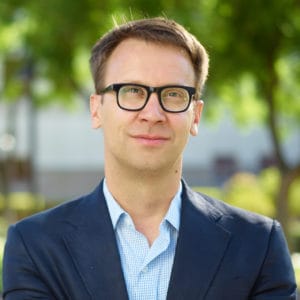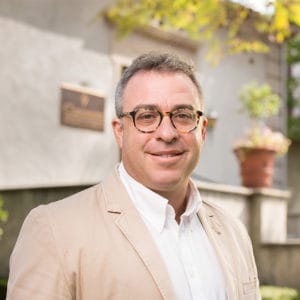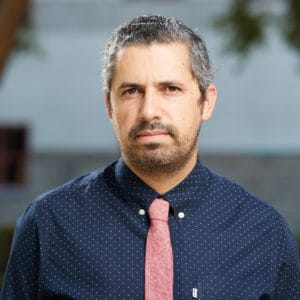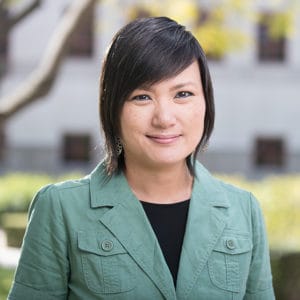Faculty
-

Matthew Bowman
Associate Professor of Religion and History
Howard W. Hunter Chair of Mormon StudiesResearch Interests
Mormonism, new religious movements, evangelicalism, religion and American politics
-

Joshua Goode
Professor of Cultural Studies and History
Chair, Cultural Studies DepartmentResearch Interests
Modern Spain, 19th- and 20th-century Europe, Genocide and racial thought, Museums and commemoration, Memory
-

Romeo Guzmán
Assistant Professor of History
Research Interests
Citizenship, Migration, Sport, Public history, Digital humanities
-

JoAnna Poblete
Professor of History
John D. and Lillian Maguire Distinguished Professor in the Humanities
Chair, History DepartmentResearch Interests
Colonialism and empire, unincorporated territories, migration and labor, comparative ethnic studies, Asian-American and Pacific Islander studies, 20th-century United States, indigenous issues, environmental history, oral history, U.S. expansionism
Extended Faculty
-
Shane Bjornlie
Claremont McKenna College
Research Interests
Late Antique history, Roman history
-
Myriam Chancy
Scripps College
Research Interests
African diaspora with specialization in its literature
-
Alfred Flores
Harvey Mudd College
Research Interests
U.S. empire in Oceania with an emphasis on diaspora, labor, indigeneity, militarization, oral history and settler colonialism in Guåhan
-
Lily Geismer
Claremont McKenna College
Research Interests
20th century liberalism in the United States, Fair housing, Liberal religion and politics
-
George Gorse
Pomona College
Research Interests
Italian Renaissance art and architecture; Italian Baroque art and architecture; Medieval art history; history of cities, palaces, villas, and gardens; history of Genoa
-
Vivien Hamilton
Harvey Mudd College
Research Interests
Medical technologies, including x-rays, in the late 19th and early 20th centuries
-
Daniel Livesay
Claremont McKenna College
Research Interests
Early American and Atlantic history; Race, family, and slavery in North America and the Caribbean
-
Charles Lofgren
Claremont McKenna College
Research Interests
American Constitutionalism, American founding, Constitutional law, Military history, War and foreign relations
-
Char Miller
Pomona College
Research Interests
U.S. environmental policy, U.S. public-lands management, Western water politics, Immigration and border security, Urban politics and development, U.S. intellectual and cultural history
-
Harmony O’Rourke
Pitzer College
Research Interests
Cultural and social history of early modern and modern Africa, Global diasporas, Gender and sexuality, West Africa, Slavery, Colonialism, Oral history
-
Albert Park
Claremont McKenna College
Research Interests
Design & architecture, East Asian history & political economy, Korean history, Modern Japanese history
-
Ralph Rossum
Claremont McKenna College
Research Interests
American Constitutionalism, American Founding, Constitutional Law, Crime and Criminal Justice, Indian Gaming Issues, Redistricting, Supreme Court, Voting Rights
-
Victor Silvermam
Pomona College
Research Interests
U.S. History, Alcohol and Drug Studies, History of Sexual/Gender Minorities, The Cold War, Labor Unions, International Labor Movements, U.S. and Britain, San Francisco Bay Area History, California History, Sustainable Development Policy
Curriculum
Courses
- History 300 (4 units)
- One Transdisciplinary course (4 units)
- Ten History elective courses (40 units)
- Six elective courses (24 units)
Up to 24 units transfer credit from previous graduate work in History may be substituted for the elective coursework requirements.
Research Tools Requirement
- Two foreign languages (or one foreign language and one research tool)
Research Papers
- Two substantive research papers
PhD Completion
- PhD qualifying exams
- Dissertation proposal
- Written dissertation and oral defense
Oral History Program
Inaugurated in 1962, the Claremont Graduate University Oral History Program has amassed an impressive collection of interviews with persons whose life experiences merited preservation and special projects, such as China Missionaries Oral History Project, funded by the Henry Luce Foundation. It is a premier resource for research into the history of The Claremont Colleges and California state government and politics.
Application Guidelines
| University Requirements | |
|---|---|
| Application Fee | $80 (fee is non-refundable) |
| Official Transcripts | Undergraduate/graduate |
| English Proficiency Exam | Required (international applicants only) |
| Resume | Applicants must submit an up-to-date copy of their resume. |
| Program Requirements | |
|---|---|
| Statement of Purpose | Please submit a 2-3 page statement of purpose that details your academic and/or professional achievements, your specific areas of research interest within your desired field of study, why you are a strong candidate for graduate studies at CGU, and your career goals. |
| Academic Prerequisites | Master’s degree required |
| Letter of Recommendation | 3 letters required |
| Standardized Test Scores | GRE (optional) |
| Writing Sample | All applicants are required to submit a writing sample of previous work in addition to the statement of purpose. You may submit samples of any length you feel indicate your writing ability, but please note that we will be unable to return any items submitted as part of your application (please, no books). Most applicants submit one or two scholarly papers or excerpts of around 10-15 pages. Writing samples should not exceed 30 pages. |
Key Dates & Deadlines
CGU operates on a priority deadline cycle. Applicants are strongly encouraged to submit complete applications by the priority dates in order to assure maximum consideration for both admission and fellowships.
Once the priority deadlines have passed, the University will continue to review applications for qualified candidates on a competitive, space-available basis. The final deadlines listed are the last date the University can accept an application in order to allow sufficient time to complete the admissions, financial aid, and other enrollment processes.
Spring 2025
Priority Deadline – November 1, 2024
Final Deadline (International) – November 15, 2024
Final Deadline (Domestic) – December 1, 2024
Classes begin – January 21, 2025
Fall 2025
Priority Deadline – February 1, 2025
Final Deadline (International) – July 5, 2025
Final Deadline (Domestic) – August 1, 2025
Classes begin – August 25, 2025
Cost & Aid
ESTIMATED TUITION (CALIFORNIA RESIDENTS, NON-RESIDENTS, INTERNATIONAL)
| Program | 72 units |
| Tuition per unit* | $2,070 |
*Based on 2025-2026 tuition rates.
STUDENT FEES (PER SEMESTER)
| $245 Student Fee |
| $150 Technology Fee |
| International Student Services Fee**: $768 fall semester, $851 spring semester **Applies to all international students (F-1 visa only) who are registered in coursework, doctoral study, or continuous registration. The fee is assessed each fall and spring semester for annual ISO accident and sickness plans and administrative fees. Subject to changes. |
For estimates of room & board, books, etc., please download CGU’s Cost of Attendance 2025-2026.